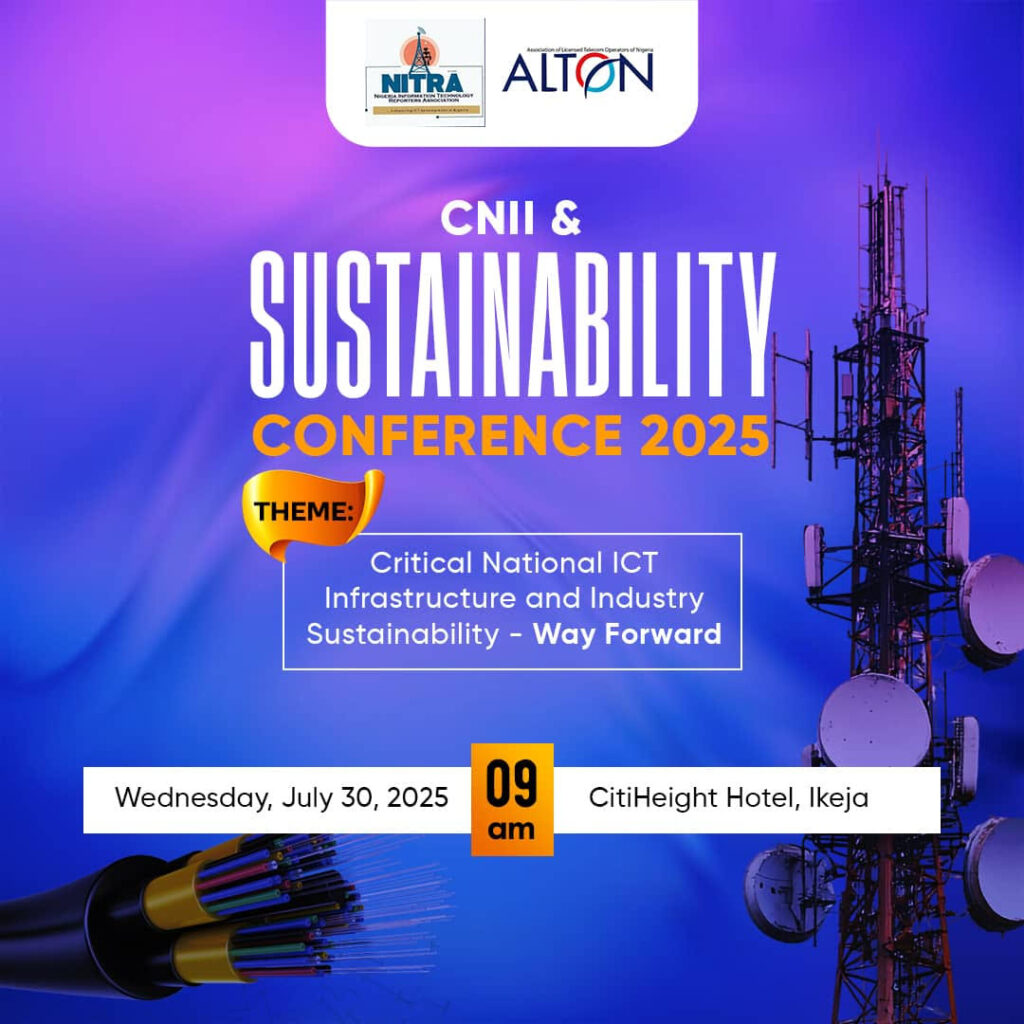News Highlights:
- NITRA and ALTON are jointly organizing the “Industry Sustainability and CNII Conference 2025”
- The forum will develop actionable strategies for critical infrastructure protection
As Nigeria’s telecommunications industry adjusts to the new status of its infrastructure being designated as Critical National Information Infrastructure (CNII), industry experts and stakeholders are preparing to engage in robust dialogue on the way forward for effective implementation and sustainability.
The Nigeria Information Technology Reporters Association (NITRA), in collaboration with the Association of Licensed Telecommunications Operators of Nigeria (ALTON), is convening a high-level industry forum to address urgent challenges and ambiguities surrounding the protection of telecom infrastructure despite its CNII designation by the Federal Government.
Scheduled to hold on Wednesday, July 30, 2025, at CitiHeight Hotel, Ikeja, Lagos, the event titled “Industry Sustainability and CNII Conference 2025: Way Forward” aims to move the conversation beyond policy declaration to actionable collaboration among stakeholders.
“It is a known fact that the Critical National Information Infrastructure (CNII) is crucial to the survivability of a nation, and that the destruction or disruption of these systems and communication networks would significantly affect the economic strength, image, defense and security, government capabilities to function, and public health and safety,” NITRA said in a statement announcing the conference.
While the Federal Government’s recognition of telecom infrastructure as CNII is commendable, NITRA warns that it is not a silver bullet. The association emphasized that internal industry issues, ranging from standardization to compliance, must be addressed in tandem for the CNII status to deliver real protection.
Chairman of NITRA, Mr. Chike Onwuegbuchi, underlined the critical need for open dialogue. “Industry stakeholders need to come around a table to broker an understanding on how to secure telecom infrastructure, standing on FG’s proclamation of CNII,” he said.
“With the CNII Bill in place, stakeholders will have to formulate measures to implement its provisions and enforce compliance. These will be the expected outcomes of the forum.”
Digital TimesNG understands that the conference will feature panel discussions aimed at tackling pressing questions: How should the law be implemented in practical terms? Is the Bill comprehensive or in need of refinement? What roles must federal and state governments, operators, regulators, and consumers play to ensure compliance and infrastructure safety?
According to NITRA General Secretary, Mr. Chidiebere Nwankwo, the event will also open a platform for public participation, allowing community members to share experiences and concerns about infrastructure security in their localities, adding that the other industry associations would be making strategic inputs to the dialogue.
Infrastructure sabotage remains one of the sector’s biggest challenges. ALTON Chairman, Engr. Gbenga Adebayo, speaking at a recent industry event, expressed concern over repeated incidents of vandalism.
He noted: “We’ve seen widespread theft of manhole covers, fibre cables and poles. In some cases, there is community resistance to infrastructure projects and unauthorised installation of telecom assets. Malicious destruction and disregard for legal approvals remain ongoing threats to the integrity of our networks.”
Adebayo stressed that solving these problems requires both infrastructural upgrades and collaborative frameworks that bind all stakeholders, from operators to government agencies and the general public.
Among those expected at the CNII Conference 2025 are the Minister of Communications, Innovation and Digital Economy, network operators, security agencies, regulators, infrastructure companies, members of the media, and decision-makers across public and private sectors.
In the face of growing threats to telecom infrastructure, the conference signals a much-needed shift from policy pronouncement to implementation strategy. It is, as stakeholders agree, an urgent call to action to preserve and protect one of the nation’s most vital arteries of development.

